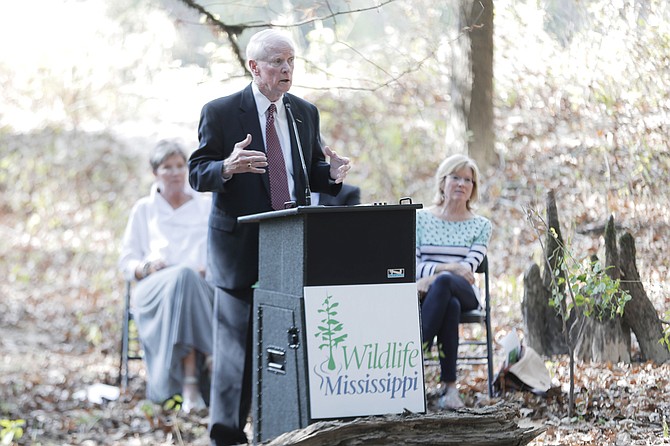Dick Hall, the central district transportation commissioner, called the deed transfer of 2,700 acres of land to nonprofit conservation group Wildlife Mississippi a “big deal.” Photo by Imani Khayyam.
JACKSON — Locals have long used the large chunk of land north of Pearl and south of the reservoir, a pie-chunk of untouched wild, for recreation. The current mayor of Flowood is one of them.
"As a child growing up in the county, we used to come here and do some extracurricular activities that I can't talk about," Flowood Mayor Gary Rhoads said, adding that he and others referred to the area as the "big woods." He spoke to a crowd gathered at the bank of the Pearl River on that land to mark the transfer of the land to a private nonprofit.
The Mississippi Department of Transportation handed over the deed to a private organization, Wildlife Mississippi, for the 2,700 acres, some of which is the last undeveloped, publicly held land in the Jackson metro area, to create a recreational area. Wildlife Mississippi named the park after Fannye Cook, an advocate for the creation of the first state department dedicated to conservation, now known as the Mississippi Department of Wildlife, Fisheries and Parks.
"This is a big deal," MDOT Commissioner Dick Hall said during the Nov. 2 ceremony, in a patch of the land that touched the Pearl River bank, overlooking the river. "This is one of the biggest deals that l have had the privilege of attending."
"When Wildlife Mississippi finishes what they are going to do to prepare it, it's going to be one of the largest urban-type green areas in the Eastern United States," Hall said. "In fact, it will be in the top 20 east of the Mississippi River, three times the size of Central Park (in New York City)."
Mitigating Harm
Hall explained before the deed presentation that MDOT purchased the land over years from International Paper as a way to offset the cost to the environment from infrastructure projects like highway expansion. The department then sets aside these mitigation lands, as they are called, to balance out the negative impact of other development. The lands remain chained off from authorized public use for now.
"As most of you know, when we construct highways, we sometimes make an unavoidable impact on wetlands and rivers and so forth, and so we create what's called a mitigation bank to mitigate for those losses," Hall said, adding that the land would help protect the Pearl River, which is the drinking-water source for Jackson, as well as serve as a flood-control area for Flowood.
Wildlife Mississippi, a nonprofit organization with experience holding mitigation lands for other projects like the Continental Tire plant construction, recently hired Libby Hartfield to manage the project. She previously was the director of the Mississippi Museum for Natural Sciences for over a decade until she retired in 2015, and now she will serve as the Fannye Cook Natural Area coordinator.
"It's going to take a while because it is such a big place, and we of course want things to be safe for people," Hartfield said, adding that she was not sure of many of the details for the park, including a timeline or whether they would charge admission.
"This nonprofit has held land before. It has always been rural land that they held for conservation purposes," Hartfield said. "This is a new thing to open something to the public."
Building off already-existing trails and paths, Wildlife plans to create permanent pathways with designated viewing spots and even, possibly, an outdoor amphitheater as a part of a central complex.
Not the First Attempt
This isn't the first plan to turn the pie slice into something for the public.
The federal government tried to create a wildlife reserve with over 5,000 acres, twice the size of the current plan.
Mike Rich, the U.S. Wildlife and Fisheries refuge director in Yazoo City, said the project derailed during the public input stage of the program, eventually failing because of the prohibitive cost of purchasing the private land bordering the park.
"The process stopped on our public-comment period when we were moving forward with the refuge," Rich said of the decision in early 2014 to halt the project. "It just wasn't right for the fish and wildlife service to be involved at this time."
Maintaining that size of land can cost the state significant amounts of money, Rich said, although he couldn't make a guess of how much.
Hall said it was an advantage to pass the land to the private organization rather than a state department. "This is not going to be a burden on the taxpayer," Hall said. "Wildlife Mississippi is going to furnish the management of the area."
Rich explained that in order to create a state-owned reserve or a federal park, purchases of the land surrounding the MDOT property would have been necessary. This plan creates a much smaller natural reserve that has private land separating it from the river and the reservoir at some points. For this reason, the Fannye Cook Natural Reserve has a blocky, offset shape.
Rich did say that private ownership of natural reserves is a national trend and fairly common.
"That's fairly common because they have to get somebody to manage the land," Rich said.
"It's always expensive; law enforcement and policing is always expensive. If you add in the public, it bumps it up."
Email city reporter Tim Summers Jr. at [email protected]. See more local news at jfp.ms/localnews.
More stories by this author
- DA Smith Wins on One Count, But Passes on 'Whistleblower' Bad Check Claims
- Mayor Yarber, Socrates Garrett Address Contracting Dispute, 'Steering'
- UPDATED: Jury Finds Allen Guilty for Cell-phone Payment, Not Guilty on Nine Counts
- Allen Trial: Defense Rests After Making Case DJP Doesn’t Collect 'Taxes’
- DJP Board Attorney Gibbs Takes Stand to Defend Ben Allen's Actions


